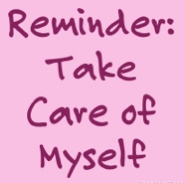
The concept of “self-care” can mean different things to different people.
I recently asked my facebook friends the following questions:
What do you do for self-care?
What do you wish you did for self-care but can’t seem to find the time?
Here are some of their answers:
- “Learning to say ‘no’ to events, so that I can have me time.”
- “I finally joined a gym that has an awesome daycare facility for use while I’m working out…I have more patience once I’ve had a break…my kid loves his social hour.”
- “I sit with my dog and cats every morning and I pray…the practice gives my day a focus.”
- “I’m starting to let myself sleep more…at least eight hours…feel more even tempered and focused.”
- “I’m retiring at the end of this month….I’m going to exercise more often, sleep more and cook more…looking forward to the ‘new’ me.”
I love that they described how their self-care practice makes (or will make) their lives better.
My ears perk up when I hear about ‘me’ time, more patience, being more focused and even-tempered.
A self-care practice can be anything you want it to be.
It can be a matter of saying “no” to something, like the friend who wanted more me time.
It can be a matter of saying “yes” to something new, like working out or sleeping more.
One year, my self-care practice was flossing my teeth every night. I’d always brushed my teeth day and night. But adding the flossing was a way for me to deepen my commitment to my health.
You can make a tiny change in your routine into a simple Self-Care practice. Like taking a short break in the mid-afternoon to get up from your desk and walk around your office.
This simple tweak to your schedule can accomplish a lot. It gives your psyche the message that you are important, that feeling good at work is important.
And if your boss needs an explanation of why you are suddenly taking a break in the afternoon, you can share this NY Times article with him or her.
Phyllis Korki writes that long hours don’t equal good work, and cites the scientific studies to back it up.
Some self-care practices take a certain amount of commitment and discipline. Just today a yoga student told me she is quitting coffee. It’s the second day and she’s feeling a little foggy.
Yet, she’s committed to it as an act of self-care because she thinks she might feel better in the longrun sans the caffeine.
Whatever you choose for your self-care practice, give it some time. Expect that sometimes you might forget to do it, or decide not to.
If you aren’t living up to your own self-care values, then re-evaluate.
Maybe your self-care practice is too time-consuming or just overwhelming.
If you have always thrown your bank statements away and refused to look at your bank balance, you can’t expect yourself to suddenly enter every debit into your check register and balance to the penny each month.
But, your self-care practice might start with keeping your wallet in order. Clear out old receipts, throw away unnecessary business cards, and get all your bills facing the same way and in denomination order.
Once you get your coins out from the bottom of your purse and put them where you can easily use them, you might just feel inspired to actually count how much you have.
The key is to make the self-care practice suit you. Decide what you want to create in your life – more ‘me’ time, more peace, more connection, more _______________.
You fill in the blank.